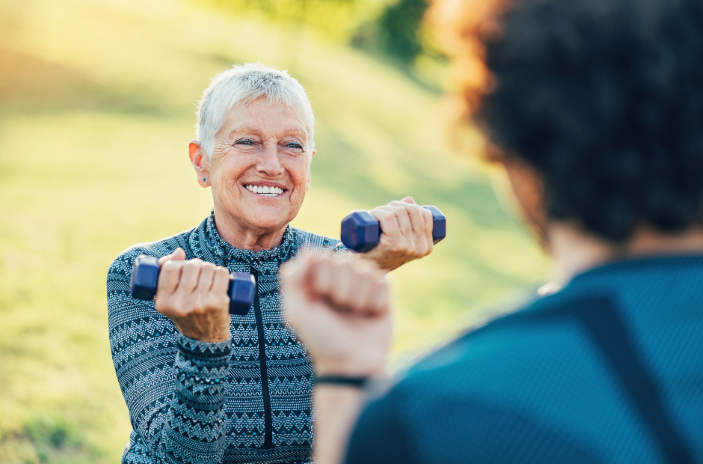

PT, DPT Jessica Denn Physical Therapy-Adult
Aging doesn’t mean slowing down – it means adjusting and thriving in new ways. Think of movement as medicine for your body and mind.
Here are a few ways to support healthy aging:
- Keep up with regular checkups and health screenings
- Fuel your body with healthy foods and plenty of water
- Prioritize good quality sleep and find ways to manage stress
- Set realistic, enjoyable movement goals
Being active keeps you strong and independent; it’s about quality of life. You don’t have to choose between rest and movement. It’s an and, not an or!
If you’re just getting started or getting back into a routine, choose something you enjoy. You don’t need to spend hours at the gym – even 5 to 10 minutes of movement helps. Some great beginner-friendly, low-impact options include:
- Walking is simple and powerful for your heart, joints and mental health.
- Water Aerobics is gentle on joints and helps build strength.
- Yoga and Pilates improve balance, flexibility and core strength.
- Cycling is great for heart health without joint stress.
- Tai Chi offers slow, flowing movement that’s excellent for balance, focus, relaxation, and fall prevention.
Try different things and see what feels good – you might surprise yourself!
Sometimes the activities we used to do don’t feel as good anymore. That’s completely normal and OK. Our bodies change over time, and it’s smart to listen to what your body needs now, not what worked 10 years ago.
It’s not giving up, it’s adapting.
You can modify activities. For instance, switch out running for walking or biking or running in the pool. Try new activities altogether. And focus on how movement makes you feel. Movement should make you feel better, not worse. Don’t be afraid to switch things up.
Strength training is essential, not optional as we age. After menopause, we naturally lose bone density and muscle mass, which increases the risk of falls and fractures. Strength training can help with all of that and more. Strength training:
- Keeps muscles strong and your metabolism healthy.
- Builds stronger bones to reduce risk of fractures.
- Improves posture, balance and even mood.
- May ease menopause symptoms like hot flashes, joint pain and brain fog.
Sometimes getting started is the hardest part. Start small and gradually build up in intensity, duration and frequency.
If you are feeling more aches and pains, a physical therapist (PT) can be a game-changer. When pain sticks around for more than a few weeks, makes you avoid activities, or you feel stiff, unsteady, or weaker than usual, it’s a good time to check in with a PT. Don’t wait for things to get worse. Early care can prevent bigger problems down the road.
We can identify and treat underlying movement issues, instruct and guide you through exercises to improve mobility and strength, and help you return to activity safely and confidently.
Staying active as we age isn’t always about doing more – it’s about doing what helps us feel our best. Whether it’s walking, swimming, lifting weights, or dancing in your kitchen, the goal is to keep moving, keep learning, and keep enjoying life.